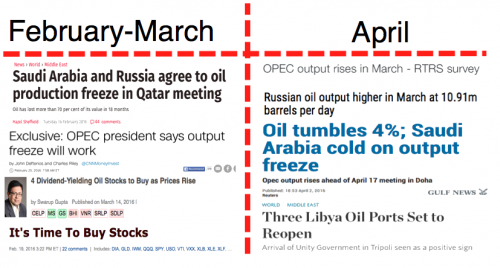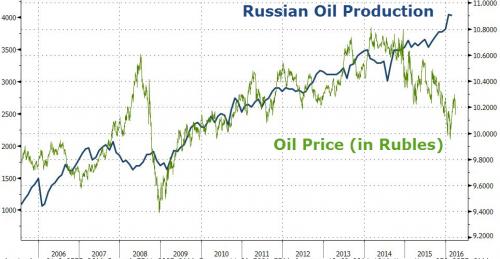
How quickly the oil production freeze narrative has fallen apart.

Source: stockboardasset
Indeed, it’s been a tough two days for oil bulls holding on to hope that excess oil production will normalize in the near term and that the world’s oil suppliers would somehow manage to curb oil production in the aftermath of the OPEC’s November 2014 cartel collapse.
First it was Bloomberg story which cited the Saudi Deputy Crown Prince Mohammed bin Salman as saying that the Saudis would not participate in an oil production freeze unless everyone including Iran joined. “If all countries including Iran, Russia, Venezuela, OPEC countries and all main producers decide to freeze production, we will be among them.”
The second one came overnight.
Recall that one month ago, just as Russia and Saudi Arabia were finalizing their “agreement” to freeze oil production which was the major catalyst for the oil surge from its 13 year lows hit in early February, we got the surprising news that far from throttling production, Russian crude and condensate production just set new post-Soviet daily record of 10.92 million barrels.

Well, overnight we got the latest update of Russian oil output, and according to Bloomberg it just set a new post-Soviet high in March “as the success of a proposed crude production freeze between OPEC members and other major producers appeared to be in doubt.”
Bloomberg reports that Russian production of crude and a light oil called condensate climbed 2.1 percent in March from a year earlier to 10.912 million barrels a day, according to the Energy Ministry’s CDU-TEK unit. That narrowly beat the previous high of 10.910 million barrels in January.
With most of the Organization of Petroleum Exporting Countries members, Russia and some others outside the group scheduled to meet in Doha this month to discuss an accord on capping output, Saudi Arabia’s Mohammed bin Salman signaled in an interview with Bloomberg that if any country raises output, the kingdom will also boost sales. Prices on Friday sank more than 4 percent after the comments. Iran previously said it plans to boost production after the lifting of sanctions following a deal to curb its nuclear program.
Saudi Arabia, Russia, Venezuela and Qatar in February first proposed an accord to cap oil output to reduce a worldwide surplus and boost prices. Brent prices in London have gained nearly 40 percent from the 12-year low reached in January.















